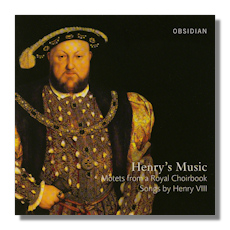
The Internet's Premier Classical Music Source
Related Links
-
Fayrfax Reviews
Verdelot Reviews - Latest Reviews
- More Reviews
-
By Composer
-
Collections
DVD & Blu-ray
Books
Concert Reviews
Articles/Interviews
Software
Audio
Search Amazon
Recommended Links
Site News
 CD Review
CD Review
Henry's Music

Motets from a Royal Choirbook
- Henry VIII:
- Consort XII
- Tandernaken
- Consort XIII
- O my heart
- Helas madame
- Without discord
- Though some saith
- Consort VIII
- Adieu madame
- Richard Sampson:
- Salve radix
- Psallite felices
- Quam pulcra est
- Benedictus de Opitis: Sub tuum presidium
- Jacotin: Beati omnes
- Philippe Verdelot: Nil majus superi vident
- Robert Fayrfax: Lauda vivi alpha et oo
- John Taverner: Christe Jesu, pastor bone
- Anonymous:
- King's Pavan
- England be glad
- Madame d'amours
- Hec est preclarum
Andrew Lawrence-King, medieval harp
Capella Alamire
Quintessential/David Skinner
Obsidian CD705
Henry's Music from the ever enterprising Obsidian label is a nicely produced, generous, and musically exciting CD in honor of yet another anniversary for 2009. Though not strictly a musical one… the English King Henry VIII acceded to the throne in 1509. The CD acknowledges a number of celebrations taking place in the UK this year; they include an exhibition at the British Library and a clutch of television series and publications. Henry's Music is not a messy and commercialized attempt to cash in on these events, though: there is real substance to this set of performances. For a variety of reasons, lovers of Renaissance music would do well to look at Henry's Music seriously.
For example, tracks 7 to 12 are world première recordings of six motets from the Royal 11.e.xi manuscript. This was a choirbook given to Henry and his first wife, Catherine of Aragon, in 1518 by a now unknown donor – possibly Petrus Alamire, a German-Dutch copyist who lived from c.1470 to 1536 and after whom the ensemble performing here under Tudor music specialist, David Skinner, is named.
As well as four anonymous pieces, other composers represented on Henry's Music include contemporaries, Taverner, Fayrfax and Verdelot (probably). And of course Henry himself: nine of his songs and consorts are interspersed throughout the rest of the CD. An implicit aim of the performances is to point up the happier side of Henry's reign. For those first 20 years or so, before the complex events of the break with Rome and implementation of what is now seen as a tyrannical imposition of religious change, the king was an active patron of the arts, an accomplished theologian and competent writer with a gift for languages. Indeed, his early reign represented something of a renaissance itself: the number of court musicians increased almost tenfold and Henry founded or re-founded a number of prominent musical institutions which still flourish.
So the 20 or so items here presented are to be viewed as upbeat and positive celebrations of music in Britain just before the even lusher flowering during Elizabeth's reign. Not that the singers and musicians (notably Andrew Lawrence-King, whose medieval harp graces several of these pieces) are trying to create an atmosphere or "concept". Each piece stands as precious and moving music in its own right: listen to the infinitely beautiful gem, "Nil majus superi vident" [tr.17], probably by Philippe Verdelot, of whose music the excellent Madrigals for a Tudor King (Obsidian 703) consisted. It has pathos, pain and a kind of survival to it that make you wish it would not end.
Similarly such songs as Henry's "Adieu madame" [tr.19] have a sensitivity and intimacy which invite close and repeated examination. Thanks to the gentle and informed playing evenly evident throughout this CD, the music breathes and gives up its strengths readily and without spectacle or puff. Robert Fayrfax's substantial "Lauda vivi alpha et oo" (for Omega) [tr.21] has the same serenity about it as pervades this CD as a whole. The secular pieces (especially by Henry) are not rough or twangy folk derivatives but polished artworks with substantial precedents and successor traditions.
Not that the musicianship of Alamire, Quintessential, or Lawrence-King and Skinner lacks life, bite or insight in any way. Quite the opposite. Their measured and dignified style is wholly in touch with such an approach, which values introspection over spectacle. Their style is tempered yet enthusiastic, careful yet invigorating. The pace of contrasts on the CD – including the grouping of the new motets – adds positively to the CD's impact. True, most of the tempi are sedate. But this is in support of the aura of opulence that obtained during this part of the sixteenth century in Britain; it makes for a very satisfying listening experience. Such a confidence also conveys the conviction that the composers active during these years knew what they were doing, were neither amateurs nor neophytes; and sensed that they were in the midst of something culturally very significant. Perhaps not Henry himself; but those who attended him did more than echo his aspirations to grandeur. They could hold their own with any composer in Europe.
Produced in the appropriately resonant acoustic of Magdalen Chapel, Oxford, and with texts in original and translated languages as well as a helpful background essay, this is a pleasing and happy collection of music with the bonus of the previously unavailable items. Recommended.
Copyright © 2009, Mark Sealey





















